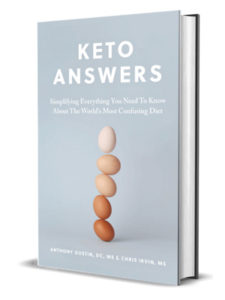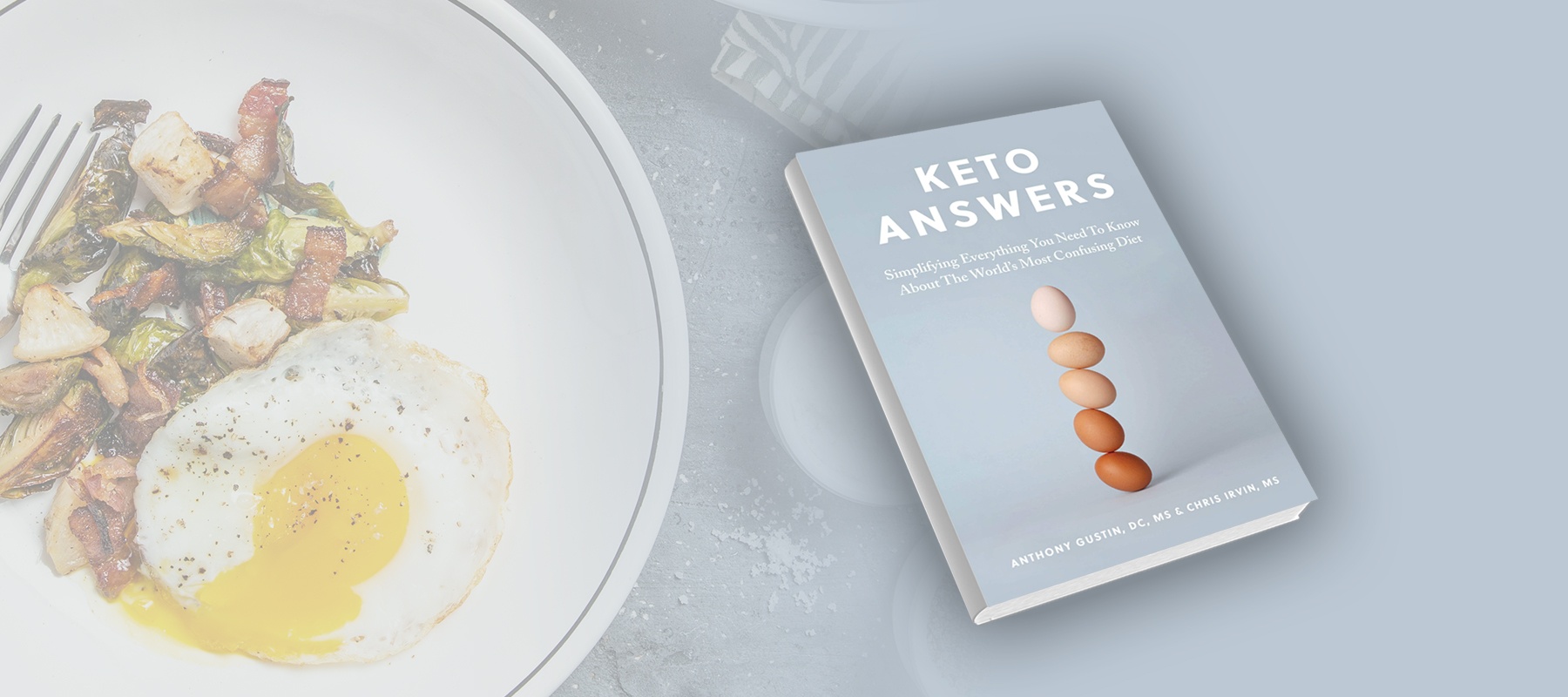Although this book by Anthony Gustin and Chris Irvin is entitled Keto Answers: Simplifying Everything You Need to Know about the World’s Most Confusing Diet, it would be better dubbed Keto Encyclopedia because it’s the ultimate guide to understanding the ketogenic diet.
This book takes readers through all the keto details, from understanding the diet, to how to get started, to mythbusting, to keto foods. Additionally, you’ll find information on supplements, fasting, and the various versions of keto (think weight loss versus medical therapy), which provides extra tools for customizing your keto journey. Plus, sections on keto for women, how to maintain the diet, and tracking macros and progress leave readers armed with everything necessary to launch into the keto diet fully educated. Scientific studies laced throughout the book and honest accounts on the lack of studies surrounding certain topics help evoke a healthy trust between the authors and the reader.
About the Authors
Keto Answers is a collaborative effort between Dr. Anthony Gustin, a functional medicine practitioner, and Chris Irvin, who holds a master’s of science degree in exercise and nutrition science with a focus on the ketogenic diet. Both authors struggled with nutritional issues throughout childhood, and both became high-school athletes. While Gustin struggled with weight issues and acne, Irvin was binging on junk food in an effort to bulk up from his scrawny size. Following high school, both authors turned to the paleo diet, which had a significantly positive impact on their health and food outlook. From there, they embarked on their own paths toward the ketogenic diet. Gustin went on to launch Perfect Keto, a company that develops keto-friendly products to encourage a healthier way of eating, where Irvin works as the education manager. Both still follow the ketogenic diet today.
What’s Inside
 In its nearly 500 pages, Keto Answers addresses the most burning questions in the keto world today. The book begins with an eye-opening introduction about the (false) nutritional information we’ve been spoonfed our entire lives and why we should take keto into consideration – now. The book is broken into three parts: “Part 1: Keto 101,” “Part 2: Ketosis in Action” and “Part 3: Ketosis and You.”
In its nearly 500 pages, Keto Answers addresses the most burning questions in the keto world today. The book begins with an eye-opening introduction about the (false) nutritional information we’ve been spoonfed our entire lives and why we should take keto into consideration – now. The book is broken into three parts: “Part 1: Keto 101,” “Part 2: Ketosis in Action” and “Part 3: Ketosis and You.”
In all three sections, there is a ton of useful information, from how our bodies and brains run off both fat and ketones (and how our bodies enter ketosis and produce said ketones), to the importance of purchasing foods from the right sources (supporting local farmers, buying pasture-raised eggs, seeking out organic and seasonal produce, and securing proteins that are 100 percent grass-fed and finished). Along the way, there’s an abundance of scientific data, but the authors’ conversational tone and casual references make it easy to digest.
Bonus: if you have a short attention span or just want a summary of what you need to know, the crucial topics include infographics, which are easy to scan and help with retention if you’re a visual learner.
What You’ll Learn
One of the most vital subject matters covered in Keto Answers surrounds what to eat and what not to eat. The book does a great job of outlining how a bunless, grain-fed burger topped with bacon might get you into ketosis, but won’t nourish your body the way a grass-fed steak with a side of fresh spinach salad will. You’ll learn about the benefits of whole foods while eating keto and how to cut out the ingredients that are detrimental to your long-term health.
More than that, you’ll learn how and why all fats are not created equal. For example, you’ll come to understand why coconut oil may be one of the best sources of fat you can utilize on keto, but MCT oil is quicker on the uptake. Additionally, vibrant, grass-fed butter, or “European-style” butter, is worth a splurge over a generic, whiter stick (don’t even think about buying a tub of spread).
Later on, read about how to how to test if you are in—and maintaining—ketosis, including a nod to our Keto-Mojo blood testing meter (thanks for the shout out!), and why a blood meter is the most accurate and trustworthy testing method (versus urine strips and breathalyzers).
Another fantastic section to peruse covers supplements, including common ones, like whey protein powder (which can quickly tackle a protein deficiency) and collagen peptides (which are exceptional for the hair, nails and skin), along with those that are critical to keeping your nutrient levels intact—like electrolytes and magnesium. There’s also interesting information on organ meat capsules (What?!) that are high in bioavailable micronutrients, as well as whether or not exogenous ketones are really necessary.
What We Like
The authors have gone far and beyond the “extra mile” to ensure this resource is comprehensive. We say resource, because it’s a fantastic book to own as reference material. Whether a new dieter, a seasoned ketonian, a nutritionist, or a patient looking into the diet to treat a condition or a disease, Keto Answers appeals to all. Although it isn’t the breeziest read from cover to cover, it is an excellent book to flip through regarding specific areas of interest. Thankfully, there’s an easy-to-navigate appendix in the back of the book that breaks down all questions, making it simple to target exact topics.
Room for Improvement
One of the best parts about this book is that Gustin and Irvin go to great lengths to convey the importance of food sourcing. Being mindful of where your food comes from (both produce and animal proteins), how it is raised, and the diet it is fed, ultimately impacts a person’s overall wellness journey and success with keto.
There is one controversial ingredient that the authors promote that should be given extra-careful consideration in terms of food ethics: palm oil. While it is rich in MCTs (medium-chain triglycerides), which are important on keto, palm oil has led to deforestation throughout regions of Asia, emitting greenhouse gases, which is contributing to the current climate change crisis. We wish the book would have touched upon this important tidbit, rather than simply adding it to the top of the recommended fat source list. If you do use palm oil, be sure to research how it is sourced. Their other recommendations of coconut oil, olive oil, ghee, and grass-fed butter are excellent options.
The Final Word
If you’re someone who has a million questions about the keto diet, stop bugging your doctor (or your best friend’s cousin) about it. Instead, pick up a copy of Keto Answers. Brew yourself a cup – or a pot – of Bulletproof coffee, and get reading. This book is a surefire way to ease all your keto curiosity.
Shop for Simplifying Everything You Need to Know about the World’s Most Confusing Diet here.


